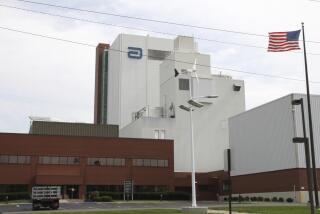Drug plant that recalled children’s Tylenol had cut staff
- Share via
Reporting from Washington — — A Pennsylvania drug plant plagued by quality-control problems that prompted a nationwide recall of children’s Tylenol and dozens of other pediatric medicines drastically reduced its workforce in recent years, according to local government tax records.
And a Food and Drug Administration inspection report earlier this year cited failure to properly train contract and temporary employees as part of a catalogue of problems at the plant run by McNeil Consumer Healthcare, a subsidiary of pharmaceuticals giant Johnson & Johnson.
Other deficiencies included bacterial contamination of raw materials, shoddy equipment maintenance and failure to investigate 46 consumer complaints “regarding foreign materials, black or dark specks” stretching back almost a year before the recall, the FDA reported.
In addition to children’s Tylenol, more than 40 pediatric products were recalled, including Motrin, Zyrtec and Benadryl.
The FDA has received several hundred complaints of adverse events, including seven deaths, after use of the recalled products, but has not established a cause and effect between the medications and the illnesses.
The performance of McNeil and Johnson & Johnson, once considered models for the industry, will be examined Thursday at a congressional hearing into what may rank as the biggest recall of pediatric medicines in U.S. history.
The cutbacks at the Fort Washington plant, in suburban Philadelphia, came amid other belt-tightening efforts throughout the $62-billion Johnson & Johnson empire. Some critics suggest the austerity measures may have jeopardized safety and quality control.
A McNeil spokesman declined to comment on employment levels at the plant or on the products it manufactured. The company has suspended production there.
The April 30 recall is the fourth involving adult or children’s Tylenol since September. Earlier this month, the FDA expanded its investigation to include McNeil’s plants in Lancaster, Pa., and Las Piedras, Puerto Rico.
The Puerto Rico plant received an FDA warning in January for tardy and inadequate handling of complaints about an odor on the outside of Tylenol bottles that some consumers said had sickened them.
And earlier this week, the FDA disclosed that it had issued a warning in March to a Johnson & Johnson subsidiary, Advanced Sterilization Products of Irvine, Calif., for failing to correct problems with sterilizing devices.
At McNeil’s Fort Washington plant, the company cut 478 jobs from the end of 2005 to the end of 2009, according to Whitemarsh Township tax records.
The figures do not include an unknown number of employees who are exempt from paying the local income tax because they live in Philadelphia, Finance Director Tom Mullin said.
Although the job reductions could reflect production shifts to other locations, the FDA report specifically mentioned a lack of training for contract employees and temporary workers — failings that point to substandard staffing levels, said Albert Wertheimer, a professor of pharmaco-economics at Temple University.
“That’s probably one of the causes of this,” Wertheimer said. “I would suspect it’s a matter of trying to get by with less, but in this case it didn’t work.”
More to Read
Sign up for Essential California
The most important California stories and recommendations in your inbox every morning.
You may occasionally receive promotional content from the Los Angeles Times.













